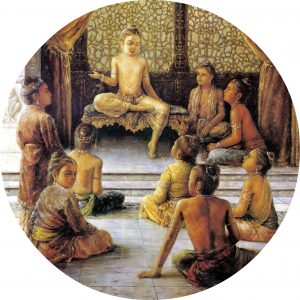
Devotee: Śrīla Guru Mahārāja, in the Gaṇeśa-khaṇḍa section of Brahma-vaivarta Purāṇa, the history of Śrī Paraśurāma is related. I read there that Lord Śiva gave Paraśurāma a protective mantra, a Kṛṣṇa-kavaca. But one devotee told me that in this Age, Kali-yuga, the only really potent kavaca is Narasiṁha-kavaca. My question is: what is true about these kavacas? Is it possible in the present day for anyone to be given, or to accept, these kavacas that appear in the ancient scriptures? Is it necessary or practical?
Śrīla Bhakti Rakṣaka Śrīdhara Mahārāja: The use of kavacas is, on the whole, an external affair. The Mantra (Gāyatrī) and the Nāma (Hare Kṛṣṇa) are all-useful and all-powerful, and using the kavaca to help externally is a thing of minor importance. The nāma, the Lord’s Name, and the Lord whose Name it is are one and the same; that is enough. It is sufficient, complete. In the mundane world to help us we can sometimes accept the kavacas, but that is not of very great importance. We may accept either kṛṣṇa-kavaca or narasiṁha-kavaca to help our bhajana (worship), but not at the cost of faith in the divine Name, nāma-bhajana, which is the best of all; even the (Gāyatrī) mantra is to help nāma-bhajana.
kṛṣṇa-mantra haite habe saṁsāra-mocana
kṛṣṇa-nāma haite pābe kṛṣṇera caraṇa
(Śrī Caitanya Caritāmṛta Ādi-līlā 7.73)
“Simply by chanting the Holy Name of Kṛṣṇa one can obtain freedom from material existence. Indeed, simply by chanting the Hare Kṛṣṇa mantra one will be able to see the lotus feet of the Lord.”
The worship of the Name, nāma-bhajana, is the highest, and we shall stick to that with our whole concentration. To see or to look for other things to help it may be allowed to a certain extent. But not much attention should be given to those external things; they are only something like a varṇa, a kind of dress, a covering for protection. So, there is not much harm if we take kṛṣṇa-kavaca or narasiṁha-kavaca with this intention: “It has come to help my nāma-bhajana life.” If meant in this way, it may be allowed, but it is not the highest standard.
The general purpose of using the kavaca is to protect us from the external or superficial difficulties. But the pure devotees of Kṛṣṇa, they won’t be afraid of any external difficulties. Rather, they may invite them like Queen Kuntī, who said: “External dangers—let them come and attack me. I don’t care for them; I shall go on with my service.”
In using the kavaca there is some karmic connection, but if that is to help the good, then its use may be acceptable. Still, in the highest form of bhajana, everything is depending on His will. The devotee thinks, “Whether I may be in danger or in happiness, I shall go on with my nāma-bhajana without any care for the external conditions that may come to me according to my previous karma. I may be in hell, heaven or anywhere else; I won’t waste my energy going to any other direction. I will go on with nāma-bhajana.” Bhajana done in this mood is of the higher quality. Do you follow?
Devotee: Yes.
Śrīla Bhakti Rakṣaka Śrīdhara Mahārāja: In Prahlāda Mahārāja, and others, we see such an attitude: “Dangers may come, at  their wish, with their extreme power to disturb me; I don’t care.” So, paśu-pākhī haya tabe—wherever my karma may take me, even to the body of bird or beast, I won’t pray to Kṛṣṇa for favourable circumstances. I shall utilize my energy best only towards Him. I shall only want from Him: “Your sweet will may be victorious. You can make or mar. You can kill me or save me. If it is necessary for Your sweet enjoyment to kill me, You can do that. I am a slave and You have every right over me, to do anything and everything.” With this conception in the background we have to make our approach towards Him, and that will be of the highest quality. Our bhajana should be in this line.
their wish, with their extreme power to disturb me; I don’t care.” So, paśu-pākhī haya tabe—wherever my karma may take me, even to the body of bird or beast, I won’t pray to Kṛṣṇa for favourable circumstances. I shall utilize my energy best only towards Him. I shall only want from Him: “Your sweet will may be victorious. You can make or mar. You can kill me or save me. If it is necessary for Your sweet enjoyment to kill me, You can do that. I am a slave and You have every right over me, to do anything and everything.” With this conception in the background we have to make our approach towards Him, and that will be of the highest quality. Our bhajana should be in this line.
In our worship we are not seeking comfort from Him or anything outside. We won’t pray: “O Kṛṣṇa, You please create protection. I am going towards You, so please manage my protection.” Our bhajana should be of this purest type: “You may do whatever you like; I want your service. I want only that Your sweet will may be satisfied by me.” There is to be such total self-forgetfulness in the service of Kṛṣṇa. The whole concentration will be: “How can I satisfy You?”
Whatever troubles may come upon us we must not deviate our attention from that main purpose to any of those external things. The quality and intensity of our bhajana will be less if we are very eager to maintain our safety as we are proceeding on the path of our devotional life. Such concerns should be uncared for as much as possible, and our only concern should be: “I want Your satisfaction.” And in that attempt, one must be self-forgetful as much as possible.
But according to their adhikāra, capacity, the practitioners may sometimes take the help of some protection on their way. That may be tolerated, but to seek protection on the path in this way is not the ideal. “I am going to You; please protect me on my way, please manage for me, for my protection.” Our fundamental attitude should not be such. But rather, we should think: “Whatever comes to me, it is Your sweet will; I won’t pray for protection.”
Devotee: I have another question connected to this. I am studying Indian Vedic astrology. In my studies I have made some astrological charts for devotees. I see the natal chart is like a photograph of the karma of the person. So my question is: what is the use of astrology for a devotee, or in devotional service? Does it have some use?
Śrīla Bhakti Rakṣaka Śrīdhara Mahārāja: Just as general education, money, learning, physical health and other things are necessary for the purpose of preaching, so may be knowledge of astrology in a particular situation. But all such items are subsidiary; they are not the all-important thing. Generally, the public is attracted by the astrological statement, so it may be used like bait to capture people, so as to gradually convert them. Just as one devotee when asked by Śrīla Svāmī Mahārāja Prabhupāda to go to China to preach, said: “I shall go there and open a hostel; in this way, men will come, and I shall capture them for Kṛṣṇa’s service!” This is, in itself, not śuddha-bhakti, pure devotion, but it is ānukūlyasya-saṅkalpaḥ, it may be favourable for the cause. Nāmācārya Haridāsa Ṭhākura used to give sweets to the children, and then ask them “Take the Name, the Name of the Lord, Kṛṣṇa. Say Kṛṣṇa!” First he is distributing sweets and then telling them “Say Kṛṣṇa!” It is a strategy like that.
So, astrology may be utilized to create some confidence in the general public so that they will think: “This man is first-class, so I should be as a disciple to him.” In this way they may be taken gradually towards the real path. Such an approach is ānukūlyasya-saṅkalpaḥ; it may be ānukūla, a favourable step towards devotion proper. But pure devotion, śuddha-bhakti, is not dependent on any such things.
Even jñāna (knowledge) and vairāgya (abnegation, indifference, renunciation), are not a part of real devotion: jñāna-vairāgyādi — bhaktira kabhu nahe ‘aṅga’ (Śrī Caitanya Caritāmṛta Madhya-līlā 22.145). Vairāgya means abnegation, “I don’t want anything,” to have no taste for all the things of this world. For example, someone may be taking food only once in a day; or even he may not be using any clothes. In all such matters he is indifferent. ‘Virāga’ means indifference to everything in this world; but that also is not intrinsically a part of devotion. And it is so with jñāna, knowledge:
na jñānaṁ na ca vairāgyaṁ
prāyaḥ śreyo bhaved iha
(Śrīmad-Bhāgavatam 2:32-33)
Both jñāna and vairāgya, which are the real property of the jñāni and yogī schools, are not a part of devotion; then what to speak of other things?
vāsudeve bhagavati
bhakti-yogaḥ prayojitaḥ
janayaty āśu vairāgyaṁ
jñānaṁ ca yad ahaitukam
(Śrīmad-Bhāgavatam 1:2:7)
Here it is told that real jñāna and vairāgya will come as the consequence of bhakti. As a result of devotion, the proper abnegation and proper knowledge will come. Otherwise, through the empirical method, ordinary knowledge and ordinary apathy towards worldly things cannot create devotion proper. “By self-abnegation, learning all these worldly things, I shall gradually attain bhakti”—it is not so. But, bhaktyā-sanjatayā-bhaktyā: bhakti is the cause of bhakti. Devotion is its own cause. When I get devotion proper, the real vairāgya, self-abnegation, and knowledge, will come in its retinue, naturally; that is normal. Otherwise, neither ordinary self-abnegation, the mood or tendency of renunciation, nor knowledge of the worldly matters can produce real devotion.
So the knowledge of astronomy, astrology, mathematics, or all the great achievements of science, like those of Einstein, may be utilized to capture the ordinary people, who may then be introduced to pure devotion to Kṛṣṇa. They are a kind of bait, like laddu sweets: by distributing the sweets one may attract the person and then tell him, who Lord Kṛṣṇa is: “The sweetest thing is Kṛṣṇa!” That is in the line of ānukūlyasya-saṅkalpaḥ, favourability to the cause. This should not be misinterpreted to mean that we should try to acquire some special power, like the knowledge of hypnotism, and hypnotise whoever will come and then give them the mantra. That is all artificial; it is a misunderstanding. But to capture the mind of the other party with such attractions like astrology, and thereby defeat their mental pride, crush their vanity, and then to help them to come forward with surrender so the true thing can be distributed to them—in this way, such knowledge may be utilized. Is it clear?
Devotee: Very clear, Mahārāja. There is something else I would like to ask. I have now passed three years in the sannyāsa-āśrama. So I want to ask, to pray to your Divine Grace for some instruction, some practical advice about sannyāsa life.
Śrīla Bhakti Rakṣaka Śrīdhara Mahārāja: Always keep in association with the vaiṣṇava of the higher plane in order to keep yourself healthy, to supply yourself with vitality. Whatever you do, whether it is preaching or any other service—it is to keep the vitality within you. That can come from the association of the ‘dynamos’: the vaiṣṇavas. That is the main idea: to keep your life intact and then go on with work. Because if the vitality diminishes, then everything will go; it will be lost. So most important is the spiritual vitality and its supply; and the source of that supply, the dynamo, is the vaiṣṇava. When the vaiṣṇava is absent, we can receive nourishment from the scripture—the Gītā, the Bhāgavatam, other books, and the writings of Gurudeva.
yourself healthy, to supply yourself with vitality. Whatever you do, whether it is preaching or any other service—it is to keep the vitality within you. That can come from the association of the ‘dynamos’: the vaiṣṇavas. That is the main idea: to keep your life intact and then go on with work. Because if the vitality diminishes, then everything will go; it will be lost. So most important is the spiritual vitality and its supply; and the source of that supply, the dynamo, is the vaiṣṇava. When the vaiṣṇava is absent, we can receive nourishment from the scripture—the Gītā, the Bhāgavatam, other books, and the writings of Gurudeva.
Devotee: I am very satisfied hearing from your Divine Grace.
Śrīla Bhakti Rakṣaka Śrīdhara Mahārāja: I consider myself fortunate if I can render some service to you in this way.
Devotee (shyly): No, no, I consider myself fortunate to sit at your feet. I cannot express my satisfaction…
Śrīla Bhakti Rakṣaka Śrīdhara Mahārāja: So, I think you are genuine, a sincere person; you have connection with that which is unlimited, of infinite character. That is your fortune.
Devotee: I would like to ask another question if I may. In my country I have contact with a very influential man. He is the President of a Karate Association and a very expert martial artist. He likes Kṛṣṇa Consciousness and wants to be a devotee, but he is not so much a brahminical type; he likes the kṣatriya-dharma. Also, he is attracted to mystic powers, and apparently, he has them. What is your Divine Grace’s view on these things? What instruction would you give to your Mission about dealing with, or accomodating them? Perhaps you could give some advice as to how I should introduce Kṛṣṇa Consciousness to this person. What would be your Divine Grace’s guidance in this case, to help a person of such a nature?
Śrīla Bhakti Rakṣaka Śrīdhara Mahārāja: Just as you have already asked, regarding the learning of jyotiṣa, astrology, so it may be in this case. It is of a very lower order to utilize physical strength to fulfill our purpose. Mahāprabhu did not accept that. When Śrīla Svāmī Mahārāja’s Maṭha in Mayapur, Śrī Candradoya Mandir, was attacked by a party of guṇḍās, gangsters, he did not oppose them with physical force. He was inside the building at the time, and he sent a kīrtana party out: “Go and offer yourself as the prey of those guṇḍās.” Those ruffians had come, entered the compound, and created some disturbance; Svāmī Mahārāja asked his devotees, “Go out and challenge them, with kīrtana. Without any weapons, go with the kīrtana party, and offer yourself as the prey of the guṇḍās.” By that, the danger subsided. So Mahāprabhu’s weapon is passive resistance. Not physical attack, offensive for offensive, but to show a passive attitude in order to conquer the offensive thing—that will be better. That is the policy of Mahāprabhu.
But when that is not possible, one in a lower stage of realization can take physical help for self-protection. And sometimes, if we see that the Deity or the vaiṣṇava is going to be prey to the rowdies, if They are being attacked or are going to be demolished, then we are justified in using any measure to protect them: the stick, or even the gun, or any other weapon available to us. At that time, we can assert whatever force possible. But generally, such measures we may not use for ourselves; for our own protection, we depend fully on Kṛṣṇa, rakṣiṣyatīti-viśvāso: “He will protect me.” But in the case of Vaiṣṇava, Guru, or Deity, we can assert ourselves as far as possible and with all our resources; we will be ready to give our own lives. If sincerity of purpose is there, then in extreme cases such use of physical force may be accepted. But it is a question of realization; according to one’s own realization, the proper adjustment in understanding and applying these principles will come.
Source: Divine Aspiration (http://scsmath.org)
Image/Art made possible by Krishnapath.org & Pixabay.com








